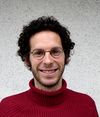Difference between revisions of "User:Micha"
| (46 intermediate revisions by 2 users not shown) | |||
| Line 1: | Line 1: | ||
| − | |||
| − | + | [[File:Micha.jpg|100px|thumb|left|Micha Hersch]] | |
| − | * email: micha.hersch at | + | |
| − | + | '''Senior Researcher''' | |
| − | + | * email: micha.hersch at hepl.ch | |
| − | + | ||
| − | * personal web page: http:// | + | * personal web page: http://mhers.ch |
| + | |||
| + | === Current position === | ||
| + | |||
| + | I am now associate professor at the Vaud University of Teacher Education [https://www.hepl.ch (HEP Vaud)], where I am involved in computer science education. | ||
=== Research === | === Research === | ||
| + | I am mainly interested in understanding, through a combination of mathematical modeling and experiments and data analysis, how biological systems can robustly self-regulate their behavior. | ||
| + | I studied this in the context of the gene [[regulatory network of the shade avoidance]] mechanism in the model plant Arabidopsis Thaliana and in the context of [[robust gradient formation]] for cell size determination in the fission yeast. | ||
| + | |||
| + | I also did some genome-wide data analysis related to human genetics, for example [[Genome Wide Association Studies]], and another one showing the [[gender bias in neurodevelopmental disorders | higher resilience of females to mutations in genes involved in neuro-developmental disorders]] such as autism. | ||
| + | |||
| + | My scientific interests include dynamical systems theory, self-organization, statistical learning theory and large-scale biological data analysis. For additional information, you can consult my [http://people.unil.ch/michahersch/ web page]. | ||
| − | I | + | I did my ph.D at the [http://lasa.epfl.ch lasa (EPFL)], where I worked on bio-inspired motor control and artificial cognition for humanoid robots. |
| − | I | ||
| − | + | And before this, I worked on automatic speech recognition at the [http://www.icsi.berkeley.edu/ International Computer Science Institute] in Berkeley. | |
| − | I did | + | Beside research and teaching, I also did data analysis and consulting for the private sector. |
=== Academic titles === | === Academic titles === | ||
| Line 24: | Line 32: | ||
=== Publications === | === Publications === | ||
| − | Look [http:// | + | Look [http://people.unil.ch/michahersch/publications here] |
Latest revision as of 08:33, 2 May 2023
Senior Researcher
- email: micha.hersch at hepl.ch
- personal web page: http://mhers.ch
Current position
I am now associate professor at the Vaud University of Teacher Education (HEP Vaud), where I am involved in computer science education.
Research
I am mainly interested in understanding, through a combination of mathematical modeling and experiments and data analysis, how biological systems can robustly self-regulate their behavior. I studied this in the context of the gene regulatory network of the shade avoidance mechanism in the model plant Arabidopsis Thaliana and in the context of robust gradient formation for cell size determination in the fission yeast.
I also did some genome-wide data analysis related to human genetics, for example Genome Wide Association Studies, and another one showing the higher resilience of females to mutations in genes involved in neuro-developmental disorders such as autism.
My scientific interests include dynamical systems theory, self-organization, statistical learning theory and large-scale biological data analysis. For additional information, you can consult my web page.
I did my ph.D at the lasa (EPFL), where I worked on bio-inspired motor control and artificial cognition for humanoid robots.
And before this, I worked on automatic speech recognition at the International Computer Science Institute in Berkeley.
Beside research and teaching, I also did data analysis and consulting for the private sector.
Academic titles
- 2009: Phd in cognitive robotics, LASA, EPFL
- 2004: Master in cognitive science, Université Paris VI
- 2003: Master in computer science, EPFL
Publications
Look here
